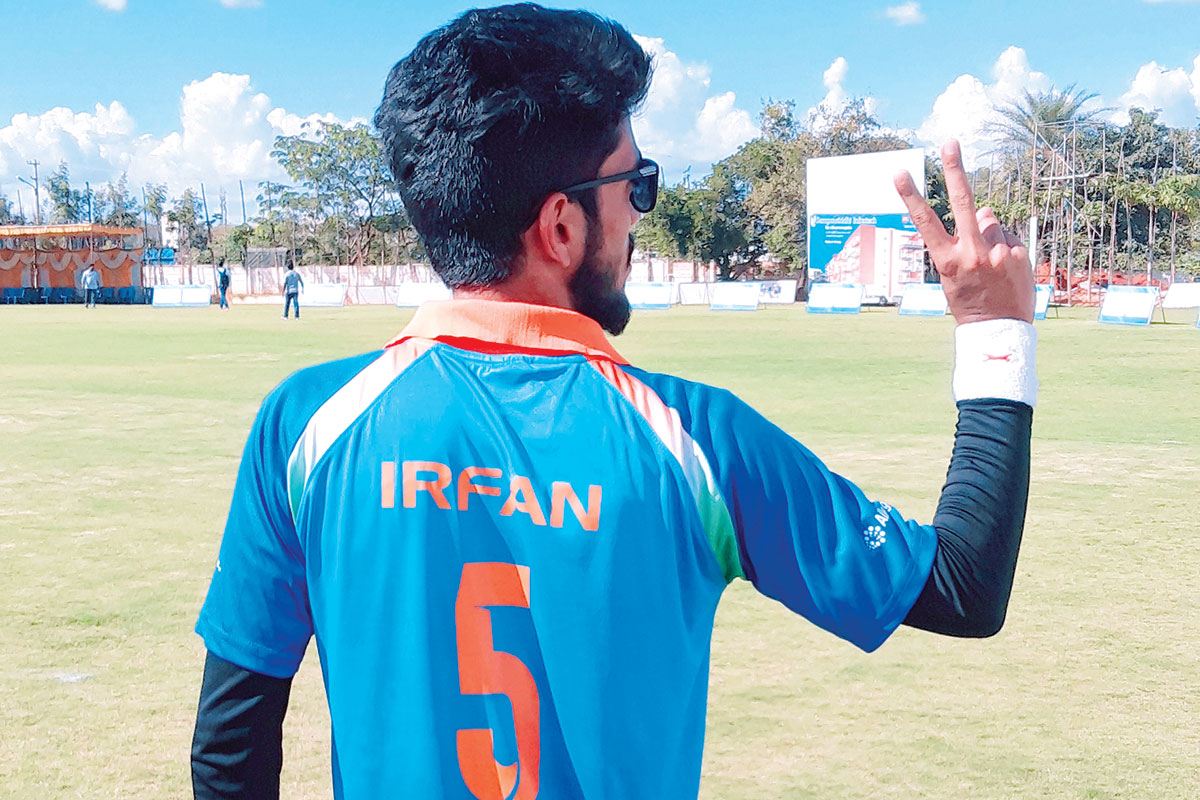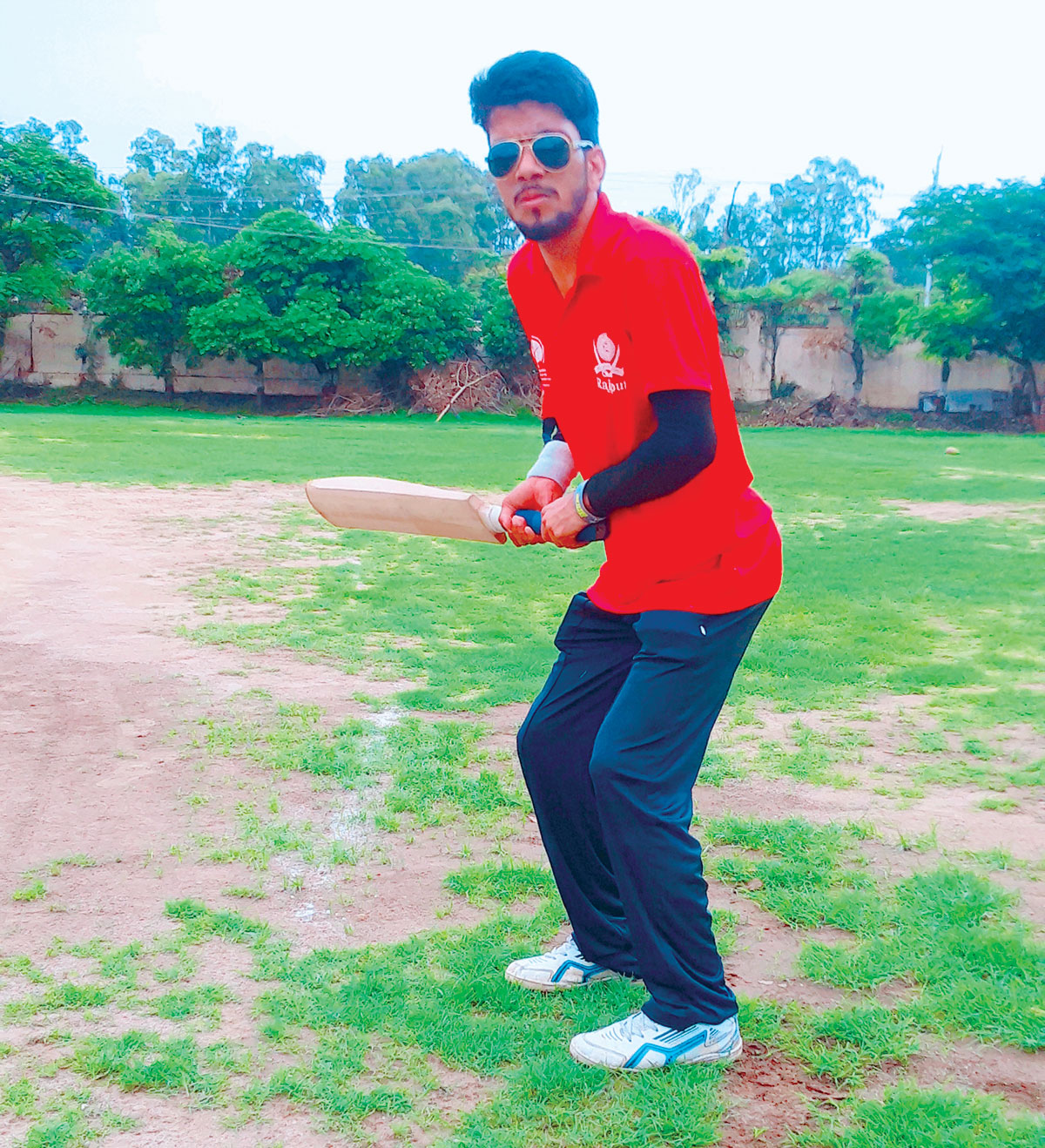When he closed his eyes forever in the lap of his mother, barely six months after his birth, Irfan was brought up in a universe completely dark. He fought his disability and got the vision that eventually landed him in the international cricket of the specially-abled population, reports Shams Irfan

The first solo journey, after losing his eyesight, literally in the lap of his mother that Irfan Ahmad Mir, now 21, took was between Dehradun in Himachal Pradesh and Kashmir. He lost his eyesight when he was barely six months old. Now he is an international cricketer.
The 18-hour road journey, during which Irfan changed two buses, and a cab, helped him feel liberated and independent. But, as Irfan sees it now, this first solo journey would have been impossible without undergoing a three-month-long Adjustment to the Blindness course at National Institute for Visually Handicapped (NIVH), Dehradun.
“After I joined NIVH in ending 2014, I could live a respectable and confident life,” said Irfan, with a smile on his face.
But more than self-confidence, NIVH helped Irfan find purpose in life and realise his childhood dream of playing professional cricket. In October 2018, Irfan played two matches against England during Triangular Cricket Series for the Blind (India, Sri Lanka and England), at Bengaluru.
However, the journey from the small Dussu village in saffron town Pampore, to the international cricket arena was not a cakewalk for Irfan. He had to literally fight his way out of stigma, indifference and misconceptions attached to disability in Kashmir. “I hated when people behaved sympathetically. I wanted to tell them, I just cannot see, but don’t act like I am dumb too,” said Irfan.
Celebration and Sorrow
In 1997, Irfan was born to Abdul Sattar Mir and Saleema Bano, in a small Dussu village, surrounded by picturesque saffron fields. He was the youngest among three brothers and two sisters. Sattar Mir, a farmer who owns orchards and a few kanals of saffron land, was elated to see him smile.
But their joy soon turned into sorrow when the six-month-old Irfan, all of a sudden closed his eyes. It left everyone in the family heartbroken and confused. “We rushed him to a doctor in Srinagar who was equally confused,” recalls Abdul Sattar. Three months later, when Irfan once again opened his eyes, small drops of blood started coming out of them. “Nobody knew what was wrong with him as he was the first blind child in our village,” said Abdul Sattar.
When the local doctors couldn’t help, Abdul Sattar took Irfan to Amritsar for specialised treatment. “There, doctors did a small surgery and took skin from his lips and pasted it under his eyes to stop bleeding,” said Abdul Sattar.
Then they told Sattar and his wife not to worry and bring him back when he would be ten years old. But as Irfan grew, so did the worries of Sattar and Saleema.
At the age of five years, Irfan started visiting local government schools with other village kids. “But he was not a regular student there,” said Sattar. “It was to keep him busy and engaged.”
A few years later, at the age of eight, Sattar approached a number of religious seminaries’ to get Irfan admitted there, but most of them refused to teach the blind. “Then Dar-ul-Uloom Bilal’iya took him for a few months and he memorized two chapters of the Quran there,” said Abdul Sattar.
Later that year, Sattar learned about a team of doctors from Dehradun is visiting Srinagar’s JVC hospital. “When I went there, I realised that my son is not the only one who is born blind. There were much worse cases and I thanked Allah,” recalls Sattar. “I was happy that at least my son could eat himself or take care of his basic needs.”
From that day onwards, no one in the family complained about Irfan’s disability. “He was always a smart kid,” said Abdul Sattar with a hint of pride in his voice.
Life is beautiful
In 2014, when Sattar first took Irfan to NIVH, Dehradun, both father and son were sceptical about what was in store for him. “But that proved to be the best decision of my life,” said Irfan with a smile.
Irfan vividly recalls his life in the village before he went to Dehradun. “Entire village map was pasted in my mind. I could move around like any other person. I even knew my orchards and different trees. But my life was limited to village boundaries,” said Irfan. “I used to pluck apples and all with my friends, but something was still missing.”
For moving outside the village, Irfan was dependent on his father or brothers. “But those three months in Dehradun changed my life completely. Now I can travel on my own anywhere in the world. I have that level of confidence,” said Irfan excitedly.
Once the confidence to be independent came, Irfan now started looking ways to nurture his childhood passion of playing cricket. “In early 2015, there were trials for the intra-zonal tournament in Dehradun and I participated,” recalls Irfan.
To Irfan’s surprise, he was selected to play at the national level, a big achievement for a newcomer like him. “I had played cricket with my friends or teachers in Kashmir but that was just for sake of fun,” said Irfan. “But now, I was playing with professional players.”
During the tournament, the captain of the Uttar Pradesh (UP) team, Zeeshan Haider, approached Irfan and offered him a spot in his state’s team. “I eagerly took his offer and started playing for UP,” recalls Irfan.
With UP’s team, Irfan played five national-level matches in places like Delhi, Mumbai, Gujarat, and Hyderabad. “It was a lifetime experience to travel with teammates,” said Irfan.
For Irfan, travelling is fun now as technology has made the life of a handicapped person like him easy. Irfan now uses Google map and other apps whenever he is travelling to avoid getting lost. “One has to first accept his disability to make things easy in life,” Irfan said. “Whenever I get stuck, I take help from people around me. It has made things easy for me.”
On cricket front, with each game, Irfan was more confident as a player and focused.
In early 2016, Irfan was approached by Ajay Thakur, a Jammu-based blind cricketer, with an idea to form a Jammu and Kashmir blind cricket team. “Till then, our state had no team for blind cricketers,” said Irfan, an all-rounder, who is known for his batting and fielding. “The idea was appealing and I readily agreed to become part of the J&K team.”
By the end of 2016, the J&K team had already played a few matches in Punjab. They also participated in a national-level tournament in Dehradun, in which they reached to the semi-final level. “We were a new team, still we came forth among eight participants,” said Irfan.
The formation of J&K’s team gave Irfan and other blind players confidence, but no recognition. “There is no infrastructure in place for blind cricketers,” feels Irfan.
In November 2017, Cricket Association for Blind in India, which is affiliated with World Blind Cricket Association (WBCA), selected 50 players from across India for the upcoming international cricket series. It included Irfan.
“I was the only player from Kashmir to get selected among 50. There was also a guy named Rohit Sharma from Jammu in the list,” said Irfan.

After trials in Pune, Irfan was selected for the upcoming India-England series while Rohit was selected for India-Sri Lanka.
“I played two matches. But as our team was very strong, I couldn’t get a chance to bat or bowl,” said Irfan. “But it was a great experience for me. Unlike others, I was in the playing eleven in all the matches.”
This series helped Irfan get recognised at the international level, something he had always dreamed about. Irfan is currently practising to get selected for the Blind World Cup (2020). “I am hopeful that I will be selected,” said Irfan.
But in order to practice, which is not possible in Kashmir, given the lack of infrastructure, Irfan has taken admission in Japanese Medical Manual Therapy (JMMT) at NIVH, Dehradun. “I am doing this to stay in Dehradun where I can practice,” said Irfan.
Ironically, there is a vast playing field in Irfan’s village but it is under construction for the last four years. “I don’t know when it will be completed,” said Irfan.
Also, Irfan is pursuing graduation through distance mode from Delhi University. “I cannot join regular college because I need breaks for playing cricket,” said Irfan.
Google Helps
Now Irfan travels to and fro between Dehradun and Kashmir frequently on his own. “After the first solo travel, I have done many travels where people get confused and think if I am really blind,” said Irfan. “Technology has helped a lot and made the life of people like us very easy. Now we don’t have to ask a person which place is this, google map tells you everything.”
During his travels, Irfan has met interesting people who ask all kinds of questions, including weird ones like, how do you eat, or how do you differentiate between toothpaste and a face wash. “We are blind but not fools,” said Irfan with a laugh.
Irfan recalls how at home while playing cricket with his friends, the biggest challenge used to be to guess where the ball is. “But, in Dehradun, I discovered that our cricket ball is different and it makes a sound when tossed around,” said Irfan. “That small discovery changed my entire life.”
Irfan accepts that playing international-level cricket so early in his career was not on his mind. “But if you believe in Allah, and then in yourself, everything is possible,” said Irfan.
As of now, Irfan is content with his life and never complains about his disability. “We want the same dignity, the same respect. That is all I crave for in life,” said Irfan. “I feel chosen by Allah. He took my eyes but gave me a vision.”















